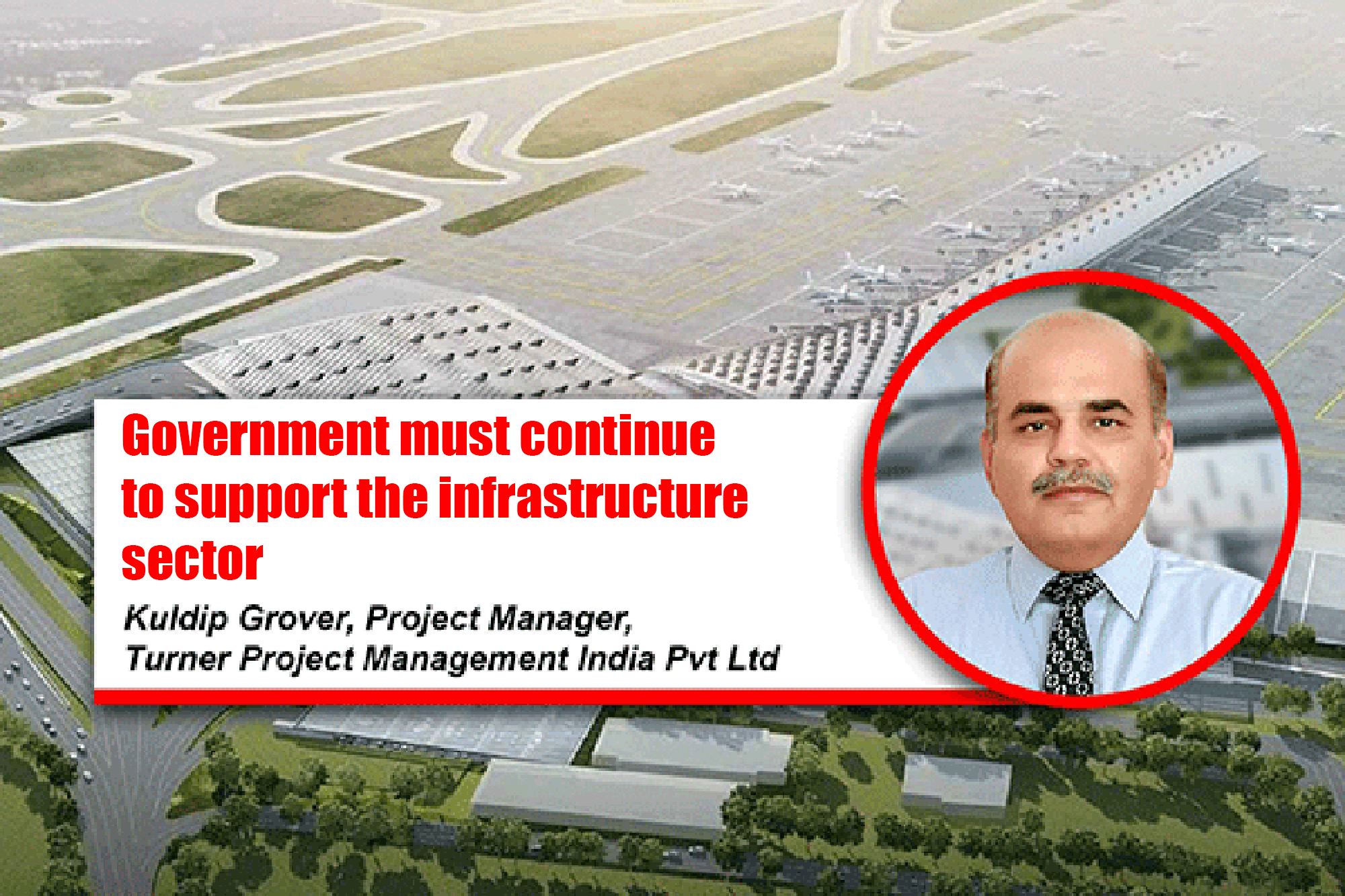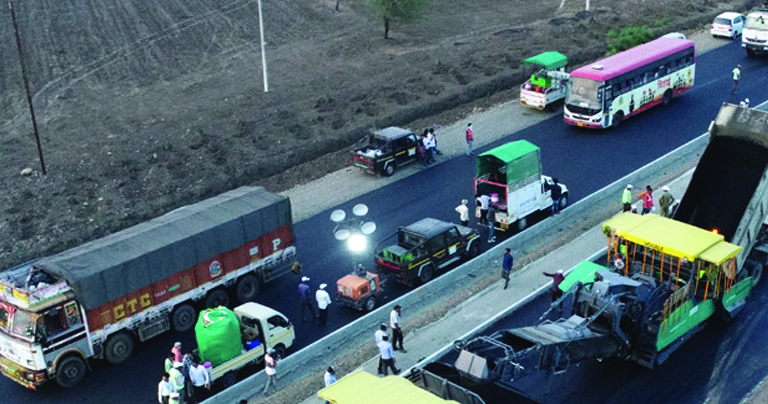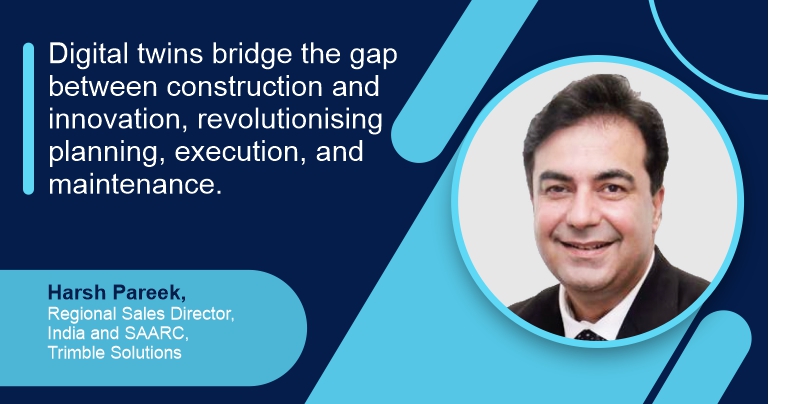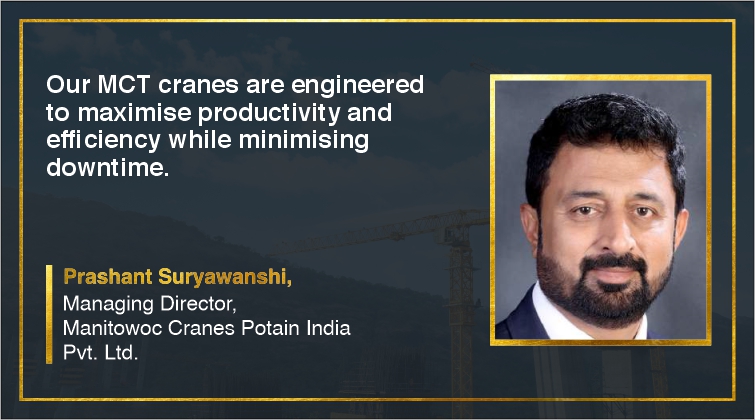Government must continue to support the infrastructure sector
By Edit Team | May 11, 2020 7:50 am SHARE

On time deliveries of infrastructure projects like roads can boost sentiments as they provide job opportunities and also boosts further investments in other allied sectors. Policy corrections to reduce bureaucratic processes will support the industry to emerge from these difficult times says Kuldip Grover, Project Manager, Turner Project Management India Pvt Ltd.
In the view of current market dynamics, what kind of forecast you have for the construction and infrastructure segment for the year 2020?
The construction and infrastructure segments have been amongst the worst hit owing to the Covid-19 pandemic. The situation will be challenging for the next few quarters, post which some stability can be expected in the sector. Liquidity will be a major issue as both public and private sector investments will take a backseat. Existing projects, especially in the private sector shall see roll-over collection shortfalls. As more projects reach the stage of criticality, access to alternative funds shall become difficult due to dipping market confidence.
But, we do see a silver lining as opportunities are also bound to arise. The realignment of global sentiments post coronavirus pandemic could lead to a shift in manufacturing base to countries like India owing to strong politico-legal systems. A robust policy framework supported by continuous public spending by the government shall help the industry even if it leads to a marginal increase in the fiscal deficit.
The emergency necessitates social spending, keeping that in view what measures need to be taken to ensure promised infrastructure and road projects are delivered on time too?
India is a welfare state which is morally committed to its masses for their well-being. The pandemic has diverted expenditure planned for infrastructure to pressing urgencies like food and providing medical assistance to citizens who have been hit hard by the pandemic.
The central and state governments must continue to support the infrastructure sector as it is an investment that is bound to yield positive returns in the long run. On time deliveries of infrastructure projects like roads can boost sentiments as they provide job opportunities and also boost further investments in other allied sectors. Policy corrections to reduce bureaucratic processes will support the industry to emerge from these difficult times.
What measures have you taken to ensure worker safety during the ongoing execution of projects?Turner has formulated a policy to deal with Covid-19 necessities and urgencies at the central level by laying the medical and administrative protocol based on guidelines issued by experts and government agencies. We insist on documented recordings of all measures taken so that complete transparency is maintained on the actions taken for the safety of the workers.
Detailed plans have been formulated for addressing both workplace related precautions and those required in labour camps during community interactions of workers. Maintenance of self-hygiene, sanitization, personal protection equipment, material handling, quarantining guidelines, and social distancing parameters have been codified for implementation at all our sites. Turner believes in a continuous exchange of information, knowledge and experience between all industry stakeholders to provide a dynamically evolving approach to ensure the safety of all workers at its sites.
How will this current market scenario increase the role of AI and automation among OEMs? Likewise, do you feel the role of indigenous technology too will increase?
Introduction of the social distancing norms in all aspects of the community and behavioural patterns has disrupted the accepted and implied standards of productivity in every industry, especially at shop floors where the challenges are multipronged. Apart from the impact on the time-cycle of operations, cost parameters have also been put under strain due to this reason.
To achieve the desired levels of productivity, AI must be leveraged to process Big Data generated through various sources. Automation for OEMs shall no longer be a choice but a matter of compulsion. AI shall become an unavoidable tool to achieve the desired optimum performance. The decision-making cycles can be significantly reduced through AI-generated models that can facilitate prompt generation of optimised building design options and quickly test the feasibility of these options in a construction project. Project planning and risk mitigation are two other areas where AI will come in handy. AI can also be leveraged to predict and assess potential challenges during the post construction phase, and address them in due time. Building Informational Modelling (BIM), an AI based application, is already in extensive use by advanced construction enterprises.
Mixed reality is becoming increasingly popular. Optimum utilization of resources, assets, and manpower is being achieved through sensors installed in construction equipment such as the hard hats worn by the construction staff. This also ensures the safety of the workforce at the sites.
What is your take on safety and security norms for large scale construction and infrastructure projects in India?
We have historically been inconsiderate regarding safety as we are a cost-sensitive society. Profits have drawn more focus than the wellbeing of those involved in the construction process.
However, this trend is changing as more stakeholders realise the indirect cost of disruptions and implications due to safety and security violations at work. Moreover, stringent provisions have been laid out under the statute for safety related delinquencies and implied penal propositions by various courts of law. Safety related aspects have been made inherent to the scheme of project executions at all levels. Lately, there has been a remarkable rise in the level of awareness regarding safety and security related issues at work. There is better awareness on the importance of being safe and injury free in the work environment.
Compared to international standards, we are yet to make sensitivities to safety related issues as a constituent part of our work culture, but we are surely on the right track as numerous organizations have started taking safety as a paramount principle. Turner has been a proud proponent of workplace safety since its inception in 1902 and is driving major efforts towards inducing the safety culture in the Indian construction ecosystem as well. Turner’s safety-first approach is trademarked as Building L.I.F.E. (Living Injury Free Every Day). The Building L.I.F.E. approach strives to eliminate all worksite incidents through pre-planning construction activities with safety engagement commencing at project pursuit.
Cookie Consent
We use cookies to personalize your experience. By continuing to visit this website you agree to our Terms & Conditions, Privacy Policy and Cookie Policy.




































-20240213125207.png)

























